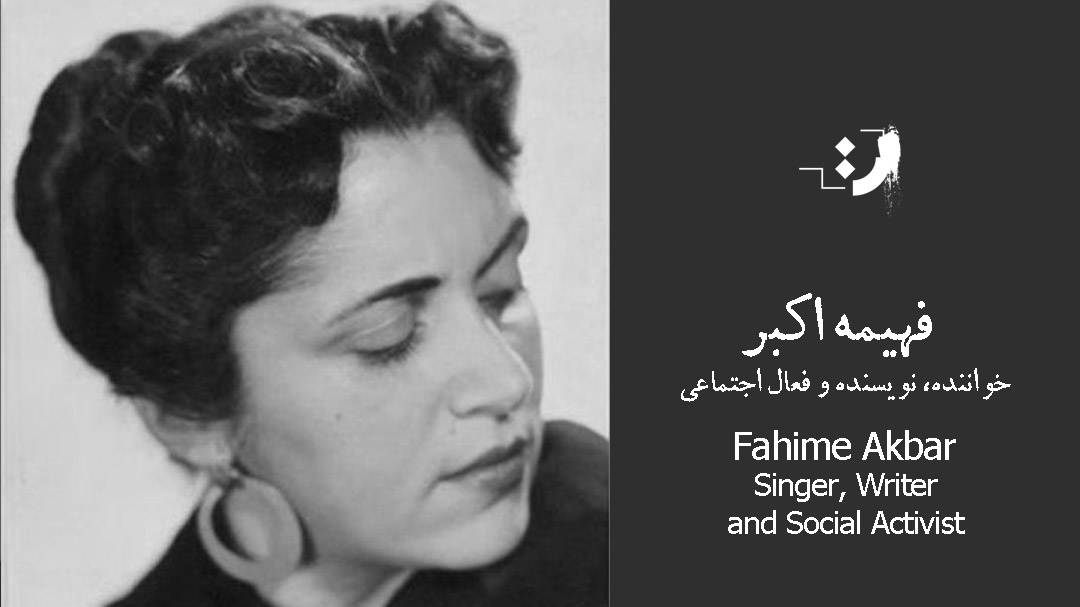Fahime Akbar

Biography
Fahima Akbar (before marrying Fahima Yamin Esfandiari; December 9, 1917 – September 3, 2009) was a singer and writer of Guilan studies and a social activist. He was the son of Asadollah Yamin Esfandiari, one of the Pahlavi period politicians, and because his father was a consul general, he spent his childhood years in Baku. Akbar’s musical talent was discovered in Baku, and after returning to Iran, he continued his musical work and became a student of Morteza Khan Mahjoubi for a while.
Akbar sings in the style of European chansons and knows how to sing in several languages. In 1317, she married Mohsen Akbar and adopted her husband’s last name. He and his wife settled in Gilan, where he researched the Gilak culture. He wrote the first book about Gilan cooking and began to sing Gilaki songs. Akbar was also active in the social activities of the people’s organization. After the 1357 Iranian revolution, he and his wife went to the United States of America with their three children. During his years in America, Akbar published a Gilki music album. He died in September 2008, at the age of 91, in Washington, DC. passed away.
Fahima Akbar was born in December 1296, in an authentic Mazandarani family in Tehran. His father, Yamin al-Mamalek Esfandiari, was one of the politicians of the Pahlavi period and was the consul general of Iran in Baku for a while. Therefore, Fahima spent her childhood in Soviet Azerbaijan until the age of twelve, and her musical talent was discovered by her teacher in Baku. Fahima started learning music during her five years in the Soviet Union.
Yamin al-Mamalek (Fahima’s father) represented the parliament and was a defender of women’s rights, including women’s education and women’s right to vote. The young Fahima went to a French school in Iran and continued her education. After returning to Iran, he was a student of Morteza Khan Mahjoubi while learning music. Fahima sings in several languages and her singing style was like Western music and European songs.
In 1317, Fahmia married Mohsen Akbar (Representative of Rasht from 1332 to 1339) and replaced her husband’s surname with her own. After the marriage, the two went to Gilan, and Fahmia researched the local sounds and customs of Gilan during twenty years of living there. His research led to the creation of Gilan’s cookbook, which includes recipes for various local dishes of Gilan. This book, which was published in 1338, is the first book that deals with the local cuisine of Gilan.
Fahmia and her husband had three children named Gilan, Goli and Fethullah, and it seems that the song “Gilaan Jan” by Jahangir Sartippour was written for Gilan Khanum, the eldest daughter of Fahima Akbar. This song is now considered one of the most famous Gilaki songs. Most of the songs sung by Fahima Akbar are composed by Jahangir Sartippur. In the nineties, an album of Gilki Fahima’s songs was released in the United States, which had 16 songs. Some songs from this album include “Gilan Jan”, “Primrose Flower”, “Nowrozi Waltz”, “Masrlo”, “New Moon”, “Jummeh Bazar”, “Bum Baz”, “Ei Bokhofte Dil”, “That Night of Spring” “, “sunbathers”, “smell the night, smell the desert, smell the winter”, and “drink, drink”. Part of the works left by Fahima Akbar is the result of her collaboration with Fereydoun Farzaneh.
Fahima Akbar was a member of many associations and charitable organizations and women’s gatherings and was also in charge of the artistic commission of Jamiat Rah No. In the book “Hospitals of Rasht” it is stated that on July 2, 1320, he became a member and inspector appointed by the first Board of Directors of Rasht Mothers and Babies Support Company (Maternity). Also, in the second volume of the book Pishgaman Farhang Gilan, written by Ebrahim Maruji, there is a photo of Mrs. Akbar, who can be seen with her husband among the caravan of Mahmoud Namjoy’s welcomers in the city of Langrod. In 1335, he opened the first Gilan booth in cultural and artistic festivals of Tehran. Fahima Akbar also spoke Russian, German, English and French and sang songs in these languages.
In the last years of the 1330s, he compiled and published a collection of Gilki songs in a collection called Okhan Dictionary, and he personally wrote some of its songs such as “Nosho, Nosho”, “Jumebazar”, “Gilanjan”, “Aftab Khaizan”, He performed “Ei Bokhofte Dil”, and “Seasiders”. Fahima Akbar wrote in the introduction of this book: “Three years ago, according to my suggestion to the group, it was decided to gradually organize an exhibition in Tehran of the way of life and arts and crafts of the people of each province, so that by this means, those who have the means or the opportunity It does not allow long journeys, in the center they can enjoy this familiarity to some extent. The people of science should have the opportunity to study more, the artists should convey their interests and tastes to eager eyes and ears and be encouraged. This proposal was approved with a great reception. This book included a total of 70 Gilki songs and their Persian translations, 15 of which were written by Jahangir Sartippour. Also, paintings by Hossein Mahjoubi were included in this book. Okhan was published in 1338.
After the 1357 revolution, Akbar’s family immigrated to the United States of America. After settling in Washington, he also attended a voluntary social center. Fahima Akbar died in September 2008 in America after a period of illness. Her obituary in the Washington Post stated that Fahima Akbar died on September 3, 2009, at the age of 91, due to heart failure, at her home in Choi Chase neighborhood.
- Birthday: 9 Dec 1917
- Death: 3 Sep 2009
- Birthplace: Tehran, Tehran, Iran
Singer, Writer and Social Activist

❤️❤️❤️❤️❤️❤️❤️❤️❤️❤️❤️❤️❤️❤️❤️❤️❤️❤️❤️❤️❤️❤️❤️❤️❤️❤️❤️❤️❤️❤️❤️❤️